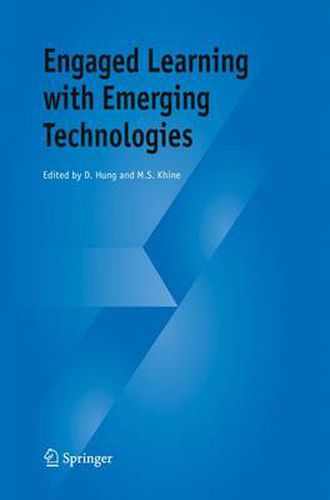Readings Newsletter
Become a Readings Member to make your shopping experience even easier.
Sign in or sign up for free!
You’re not far away from qualifying for FREE standard shipping within Australia
You’ve qualified for FREE standard shipping within Australia
The cart is loading…






This title is printed to order. This book may have been self-published. If so, we cannot guarantee the quality of the content. In the main most books will have gone through the editing process however some may not. We therefore suggest that you be aware of this before ordering this book. If in doubt check either the author or publisher’s details as we are unable to accept any returns unless they are faulty. Please contact us if you have any questions.
Gerry Stahl Drexel University, Philadelphia, USA The theme of engaged learning with emerging technology is a timely and important one. This book proclaims the global relevance of the topic and sharpens its focus. I would like to open the book by sketching some of the historical context and dimensions of application, before the chapter authors provide the substance. Engagement with the world - To be human is to be engaged with other people in the world. Yet, there has been a dominant strain of thought, at least in the West, that directs attention primarily to the isolated individual as naked mind. From classical Greece to modern times, engagement in the daily activities of human existence has been denigrated. Plato (340 BC/1941) banished worldly engagement to a realm of shadows, removed from the bright light of ideas, and Descartes (1633/1999) even divorced our minds from our own bodies. It can be suggested that this is a particularly Western tendency, supportive of the emphasis on the individual agent in Christianity and capitalism. But the view of people as originally unengaged has spread around the globe to the point where it is now necessary everywhere to take steps to reinstate engagement through explicit efforts. Perhaps the most systematic effort to rethink the nature of human being in terms of engagement in the world was Heidegger’s (1927/1996). He argued that human existence takes place through our concern with other people and things that are meaningful to us.
$9.00 standard shipping within Australia
FREE standard shipping within Australia for orders over $100.00
Express & International shipping calculated at checkout
This title is printed to order. This book may have been self-published. If so, we cannot guarantee the quality of the content. In the main most books will have gone through the editing process however some may not. We therefore suggest that you be aware of this before ordering this book. If in doubt check either the author or publisher’s details as we are unable to accept any returns unless they are faulty. Please contact us if you have any questions.
Gerry Stahl Drexel University, Philadelphia, USA The theme of engaged learning with emerging technology is a timely and important one. This book proclaims the global relevance of the topic and sharpens its focus. I would like to open the book by sketching some of the historical context and dimensions of application, before the chapter authors provide the substance. Engagement with the world - To be human is to be engaged with other people in the world. Yet, there has been a dominant strain of thought, at least in the West, that directs attention primarily to the isolated individual as naked mind. From classical Greece to modern times, engagement in the daily activities of human existence has been denigrated. Plato (340 BC/1941) banished worldly engagement to a realm of shadows, removed from the bright light of ideas, and Descartes (1633/1999) even divorced our minds from our own bodies. It can be suggested that this is a particularly Western tendency, supportive of the emphasis on the individual agent in Christianity and capitalism. But the view of people as originally unengaged has spread around the globe to the point where it is now necessary everywhere to take steps to reinstate engagement through explicit efforts. Perhaps the most systematic effort to rethink the nature of human being in terms of engagement in the world was Heidegger’s (1927/1996). He argued that human existence takes place through our concern with other people and things that are meaningful to us.